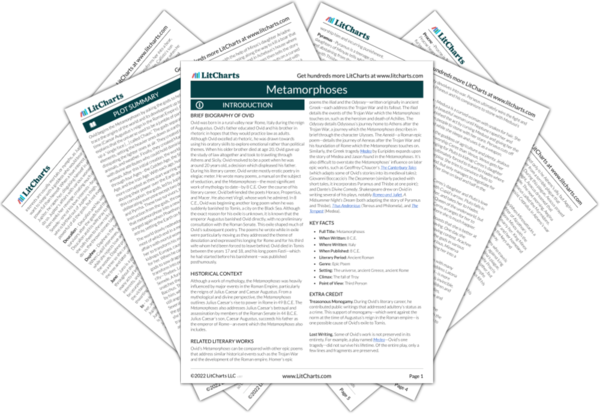Summary
Analysis
Everyone in Thebes now acknowledges Bacchus as a new god. Semele’s sister Ino—who helped raise her nephew Bacchus—is fiercely proud of Bacchus, as well as of her own husband Athamas and their children. Queen Juno is furious that her rival Semele’s son Bacchus caused Pentheus’s death, turned Minyas’s three daughters into bats, and is causing everyone to go mad with revelry. Juno wants to punish Ino, too, for Bacchus’ existence.
Juno is relentless and merciless when it comes to punishing Jupiter’s love interests. She punishes the human world as a way of venting her anger and jealousy at her husband’s infidelity. As a goddess, she is not the arbiter of justice, as readers might expect, but rather a figure whose emotions cause horrible tragedies to occur to blameless mortals.
Themes
Queen Juno decides to pay a visit to Hades. Ovid asks the reader to imagine a cold, misty path winding along the Styx River. This path leads to Hades—the land of the dead—which is full of bodiless spirits wandering aimlessly. Queen Juno watches the perpetual torment of Athamas’s brothers who both live in Hades. She hates that Athamas is allowed to live happily on land when his wife’s nephew is Bacchus. She asks one of the three Furies—the three goddesses of vengeance who have hair of snakes—to drive Athamas to madness and crime. The Fury—Tisiphone— consents at once, and Juno returns to heaven.
Instead of merely transforming Ino and Athamas, Juno decides to seek help from Hell. While the gods can alter forms, it seems that they cannot alter a character’s personality or make them wicked. Similar to the way Envy represented the epitome of the vice of jealousy, Tisiphone represents the epitome of madness and evil. These incarnations of the vices do more harm than the gods because they poison their victims’ very essences rather than simply transforming them into another physical form.
Themes
Tisiphone grabs a bloody torch and travels to Ino and Athamas’s palace. Ino and Athamas are frightened by the ominous presence of the Fury, who tosses her head to make her snakes hiss. She then flings a handful of serpents into the palace. The snakes slither over Athamas and Ino and breathe poisonous breath over them. Tisiphone then pours a poison of crime, lust, and madness over Athamas and Ino. She dances around with her bloody torch, then departs.
In order to punish Ino and Athamas, Juno has them poisoned to become mad, lustful, and criminal. In this way, she seems to want to punish them by making them worthy of punishment, making this another example of her punishment of an innocent victim.
Themes
Athamas goes mad, telling his hunters to trap Ino and her two children, whom he believes are a lioness and cubs. He runs after Ino, snatches the baby from her arms, and shatters its skull on the stone floor. Ino screams and runs from the palace, calling on Bacchus to help her. From afar, Queen Juno laughs. She has Ino climb up a steep cliff and jump with her other baby into the ocean. Venus, who pities Ino, calls on Neptune to transform Ino and her baby into sea-gods, and he grants her wish.
Juno’s punishment of Ino and Athamas is barbaric and heart-breaking. Athamas kills his own children and chases his wife as if she is an animal he is hunting. While this is happening, Juno is watching and laughing. This paints Juno as a cruel and petty goddess who uses her power to vent her emotions and inflate her triumph instead of to enact justice.
Themes
Get the entire Metamorphoses LitChart as a printable PDF.

Ino’s companions run to the cliff and grieve because they believe she has died. They curse Queen Juno. Angered by their insults, Juno turns Ino’s companions into stone as they attempt to jump off the cliff to follow their friend to her death. A few others she turns to gulls, who repeatedly brush the sea’s surface.
Ino’s companions justly feel that Juno is deplorable and cruel. Instead of worshipping her, they want to dethrone her, but this feeling—no matter how justified—only leads to their punishment, too. This shows that the gods’ power—at least Juno’s—is tyrannical.
Themes












